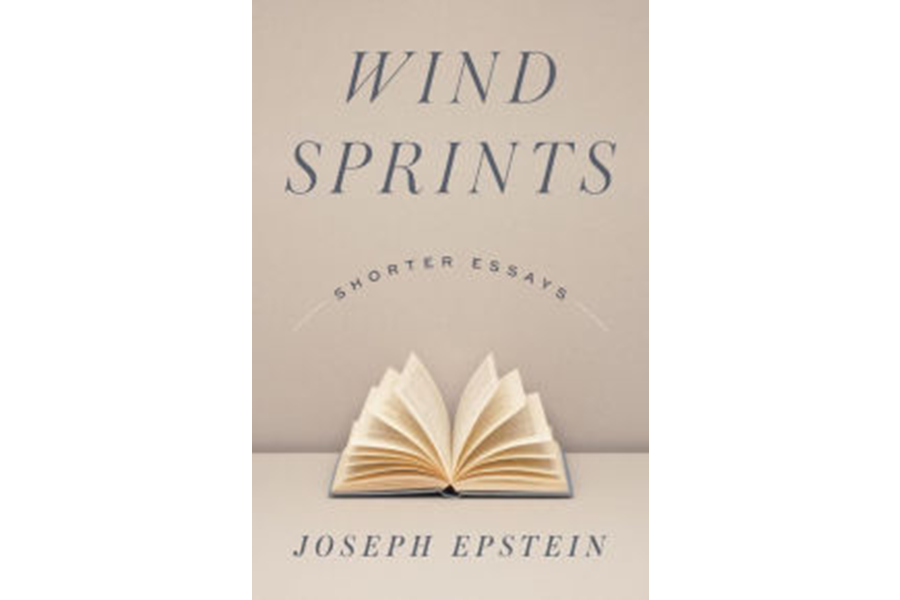'Wind Sprints' serves up the wit of Joseph Epstein in bite-sized pieces
In “Wind Sprints,” his latest collection of essays, Joseph Epstein confesses to literary tippling – sampling bits of prose while in the supermarket line, during television commercials, or even in traffic.
“When driving alone, I keep a magazine or book on the empty seat next to me,” he admits. “I get in a paragraph or two at a stoplight and am usually interrupted by a honking – and slightly ticked – fellow driver.”
Some kinds of books are easier to quickly sample than others, Epstein adds, though he doesn’t mention whether his own prose is tipple-worthy. In his earlier books, at least, Epstein hasn’t been the kind of author one can enjoy in a quick snort. He excels at lively, instructive, and often funny essays that sometimes run to 10,000 words. The only complication in starting them is that they’re so charming and chatty that one cannot easily put them down. A reader who begins an Epstein piece behind the wheel is likely to be stalled on the freeway for a very long time.
Happily, Epstein’s loyal fans now have a speedier alternative in Wind Sprints, which assembles his briefer pieces, each usually no more than a couple of pages. Most of them originally appeared in the “Casuals” column of The Weekly Standard, the conservative weekly that begins each issue with a short familiar essay on a light topic.
Despite their earlier presence in The Standard, the pieces in “Wind Sprints” advance no political views, unless one classifies as conservative Epstein’s general suspicion of change for change’s sake. Among the lifestyle trends raising his eyebrows are fad diets and speed-reading, multitasking and cell phones, audiovisual aids and designer coffee, e-readers and happy talk on network news. He is, alas, not even entirely happy with the concept of “Wind Sprints,” which is writing – and reading – that aspires to be short and sweet.
“Writers continue to produce six-hundred page novels and two-volume biographies and, in the case of the Danish writer Karl Ove Kanusgard, continuous autobiographical works running to six and more volumes," Epstein tells readers, “but the current tendency in serious as well as purely entertaining writing is for shorter and shorter pieces, books, even lectures and talks. The world has, if not perhaps run out of patience, considerably shortened its attention span.”
Yes, the word “curmudgeon” inevitably comes to mind when reading Epstein, who seems like a smarter and eminently more literate version of Andy Rooney, the now-departed chronicler of quotidian pains and pleasures.
Like Rooney, Epstein excels at essays that simulate the cadence of conversation, a feat so seemingly artless that it’s easy to take for granted. In an essay here on great talkers – he cites Samuel Johnson, Coleridge, and Lord Macaulay among the champs – Epstein defines what makes a master of gab: “wide knowledge, deep insight, brilliant formulation, wit, and impressive anecdotes.”
Those qualities perfectly describe Epstein’s essays, which brim with easy-going erudition and humor. A former professor of English who once edited The American Scholar, Epstein appears to have read everything, and he’s famous for salting his reflections with colorful quotes from other writers. He ends up writing an essay about this predilection in “Quote-idian,” one of the more amusing selections in the book. “I write down interesting items from my reading, which I keep in small notebooks. I have more than 20 such notebooks,” he writes. “I have a weakness for quoting Paul Valéry, the French thinker and poet, who said so many smart things usually seasoned with a nice tang of paradox. ‘Everything changes but the avant-garde’ is a characteristic Valéryism, as is ‘The future isn’t what it used to be.’”
Though an abiding debunker of popular fashion – he says, “I’d sooner put on Spandex shorts for a bike ride as give the Charles Eliot Norton Lectures in a Speedo” – Epstein also affirms what he likes, which makes his essays something more than an exercise in iconoclasm.
Not surprisingly, Epstein’s enthusiasms tend to be traditional ones – ballpark hot dogs, the company of his pet cat, the joys of book shopping. “The remainder of my reading life should be devoted to filling in the gaps of the great books I’ve not yet read or rereading those I read with too little understanding,” Epstein sighs. “Yet I continue to acquire new books. At what point does bibliophilia turn into bibliomania? I fear I may have reached it.”
Epstein has written more than two dozen books, and his fans dealing with their own cramped bookshelves might be tempted to wonder if they can add yet another one to their already crowded collection. Go ahead: “Wind Sprints,” like Epstein’s other outings, is a keeper.
Danny Heitman, a columnist for The Advocate newspaper in Louisiana, is also an essayist for Phi Kappa Phi Forum magazine.








